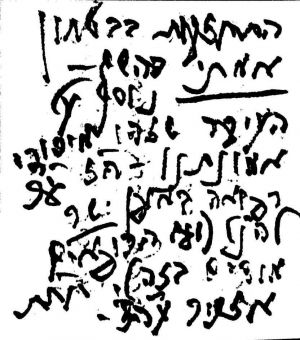Bitachon


bitachon in G-d is one of the foundations of Judaism. The attribute of trust (bitachon) is included in the mitzvah of faith required of every Jew in their G-d. Trust adds to the faith in the existence of the Holy One Blessed Be He and His unity and oneness, with certainty and positive thinking about everything surrounding the believer.
The level of trust required from a Jew is absolute - to believe and rely on G-d that everything that happens is under His control, and even in moments of crisis and trial to trust in G-d that He will do good and provide for all one's needs. The Alter Rebbe writes in Tanya Igeres Hakodesh that whoever worries about matters of this world essentially denies G-d, and is like the wicked who worry only about their own benefit.
In Chassidic Teaching[edit | edit source]
Chassidus explains that the very trust that things will be good causes the situation to actually change for the better. In Chassidus, the phrase "think good and it will be good" expresses the entire concept of trust in the Holy One Blessed Be He, since He is the nature of good to do good, meaning that G-d from His side is only good, even if not revealed openly. Therefore, when we believe in this, it will indeed become revealed as perfect good.
Levels of Trust[edit | edit source]
The Rebbe details several levels of trust, meaning the level of trust depends on the level from which this trust originates:
Trust in general comes from a person's love for G-d, like a son's love for his father, and therefore he is confident that G-d who loves him will save him from all evil.
- The first manner is when a person's trust comes from the person's love for G-d that originates from his attribute of kindness. Then, although he trusts in G-d, since the root of the trust is from the level of kindness and opposing kindness there is also severity - judgment, there is concern that severity might overcome kindness and therefore the trust is not complete.
- Higher than this is the measure of trust that comes from love originating in the intellect. This love is at a level above judgments and opposition, therefore he has no concern or doubt that the kindness will be nullified, and the trust is absolute.
The deficiency in the first level is that despite absolute trust in the existence of kindnesses, one does not trust that it will actually be drawn down to him below. But when the root of trust is from love at the level of Kesser (Crown), and the analogy given is of two lovers who made a covenant of peace between them, which is above intellect, and specifically in it there are no changes. And so it is also with the Jew's love that comes from his essence, for G-d promised "I have loved you, says G-d" and he is confident that G-d will act and influence only for his benefit.
Impact on Life[edit | edit source]
When a person trusts in G-d, it influences expansion and divine flow in their personal life.
A person who lacks trust in G-d closes the divine 'faucet' of influence, causing financial constraints
The Rebbe wrote to someone that the more their trust in G-d grows, the more successful their medical treatment will be
The Rebbe's Advice[edit | edit source]
- Visualizing the Rebbe's face
- Reciting Psalm 23: "A psalm of David: G-d is my shepherd"[1]
- Following doctors' instructions regarding taking anxiety medication and the like
See Also[edit | edit source]
Further Reading[edit | edit source]
- Increase in Trust and Joy, from 'From the Kingdom's House' Kfar Chabad weekly magazine issue 1850 page 14, 1851 page 16
- Gate of Trust - English Translation, Rabbi Israel David Klein and Rabbi Yitzchak Yarmush, Kehot Publication Society 5781
- ↑ Letter from 8 Iyar 1968, From Igros Kodesh Volume 25, Letter 9,487, and there in Letter 9,571: "Study until you know the content (not necessarily the words) of Chapter 23 in Tehillim (it doesn't matter in which language you learn it). Say the above mentioned chapter on Shabbos Kodesh, Monday, and Thursday, bli neder."
